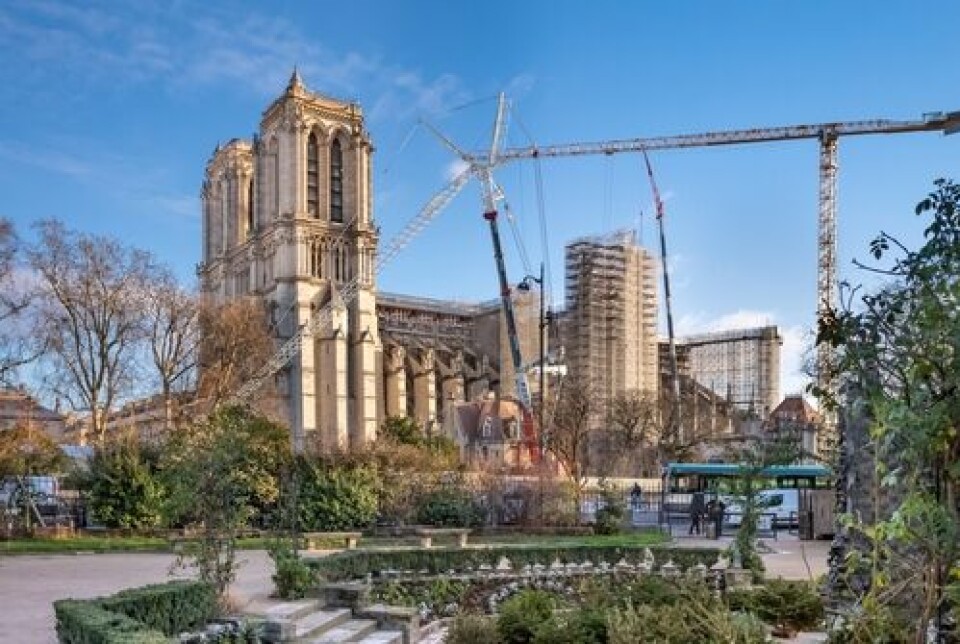-
How to dispose of bulky waste in France
Furniture, white goods…gas bottles? What counts as bulky waste and how to dispose of it
-
‘Super flu’ gains ground in France, vaccination urged
Strain of virus is more transmissible than counterparts leaving hospitals at risk of being overrun
-
‘No-licence’ cars: six rules to know in France in 2025
Double the number of these cars were registered in 2024 compared to 2019
French language defenders sue Notre-Dame over English translations
Campaigners argue only translating the cathedral’s signs into English promotes dominance of that language

French language defenders are suing Notre-Dame cathedral for only translating signs into English.
They filed a complaint against the landmark at a Paris court on Monday (March 20), which is International Francophonie Day, an annual celebration of the French language and Francophone culture.
Read also: Make sense of La Francophonie
The association behind the complaint, Défense de la langue française, argues that only translating signs into English promotes the international dominance of the language.
It has already been successful at enacting change at another Paris landmark: it made the same complaint against the Eiffel Tower. Signs in Spanish, alongside the English and French ones, will now be introduced.
Their campaign has the law on its side. A 1994 French regulation states all public buildings must translate signs into at least two languages.
Many of the panels explaining reconstruction work at Notre-Dame, following the devastating 2019 fire, are written in English and French.
Not the first time that the use of English language causes controversy
Historically, it is not solely the translation of signs into English that causes dispute in France, but equally the use of anglicism.
Read also: ‘Language police’ jump on anglicised use of French word ‘juste’
One example was in 2019 when the mayor of Marennes-Hiers-Brouage in the Charente-Maritime, Mickaël Vallet, leads a personal counter-attack of anglicisme and bans a promotional campaign from the telecom company Orange from his town until they rename their Orange Truck a Camion Orange.
He went as far as to say that anglicisms were an attack on French citizens.
Les anglicismes sont une agression contre les citoyens. @GroupeLaPoste @orange et autres grandes entreprises ne sont pas à la hauteur et font honte à leur histoire. Ici ma lettre expliquant mon refus d’autoriser un « Orange Truck » sur le domaine public de la commune. pic.twitter.com/JD5J2JJ34M
— Mickaël Vallet (@mickaelvallet) November 6, 2019
In the end, Orange agreed to rename their truck 'camion-fibre', something he was very proud of.
Bienvenue au « camion-fibre » de @orange à @MarennesHB
— Mickaël Vallet (@mickaelvallet) January 15, 2020
Le 20 janvier réunion d’information du @departement17 sur le très haut débit.
Comme quoi, il suffit de demander et de faire preuve de vigilance sur ce qui nous est commun : la langue. https://t.co/G8rEZYzisv
As well as the current dispute with Notre-Dame, the association Défense de la langue française is also targeting 20 other public bodies, including the national postal agency, La Poste, over the name of its banking service, “Ma French Bank”.
You can find out more about the association (in French) on their website here.
Related articles
Franglais ou Frenglish? The history of French resistance to English
Your selection of ‘funny, bizarre’ English words used in French
Comment: Why use anglicisms when we have perfectly good French words?
€50million Notre-Dame Cathedral landscaping project approved in Paris
























